Issue Number 42, Fall 2018
Contents
- When we went to Ontario by Gene Berson
- Fall Squirrels by Gene Berson
- Under the Hunting Moon by Cameo Marlatt
- Among the Tennessee Pines by Anna Citrino
- Upon Learning Buddhist Monks Have Made Trees Priests by Anna Citrino
- Drūgath by David Axelrod
- The Diplomatic Envoy by David Axelrod
- The Thirst-Bag by David Axelrod
- Temperature Blanket by Natalie Tomlin
- The Science Teacher by Robert Fillman
- Migrations by P.V. Beck
- This Old Earth by P.V. Beck
- Tidewater by L.A. Weeks
- Crab Country Litany by L.A. Weeks
- Not the Nightly News by Dawn McGuire
- every rock by Marybeth Holleman
- Whales at Night by Marybeth Holleman
- Psalm of the Four Corners by Beverly Burch
- Psalm of the Glass City by Beverly Burch
- Psalm of the Traffic Stream by Beverly Burch
- Psalm of the Blue Ridges by Beverly Burch
- Old Logging Road by Neva Bryan
- Meanwhile, at Key West by Shalamar Sibley
- The Last Remaining Male Northern White Rhino* by Dilantha Gunawardana
- Autumn by Erin Jamieson
- Plastic Debris, Borne by Kelly R. Samuels
- Antarctica by Adam Scheffler
- Signs of Changing Climate in My Garden by Bonnie Overcott
- To Be Greeted at the River by Carter McKenzie
- First September in Tuolumne by Travis Davis
- A Forest is a Castle by Dan Cardoza
Archives: by Issue | by Author Name

When we went to Ontario
by Gene Berson
Gene lives in the northern California foothills in the Yuba River watershed. Everyone goes to the river. Like a temple, with its falls its rapids its green pools, it seems to restore everyone in a personal way. We feel our kinship through it.

we often saw Adirondack chairs
at the end of a pier that extended far
into lake after lake
they didn’t make you feel sad exactly
they were kind of a blues note
that stirred a yearning
for another life, or for something
that may never be
sometimes two people
would be sitting there
looking out on the lake
not saying anything
but mostly there were just
the chairs, at the end of the pier
then the lake
and the changing light
the chairs were waiting
people not making it down to the water
as often anymore
sometimes only one, angled
to suggest the favorite perspective of a spouse
who had become part of the view.
It seems irrefutable that we die alone
even after a long life together
but those chairs made you uncertain
as if everything were poised—
boulders in a boulder field—
we drove by each lake
piers carrying chairs would float into view
glide along the side window
slightly more slowly
than cars we were passing
contract in the mirror
and disappear.
Then they beckoned us from memory
their solitariness corresponded to our own
afflicted us with their forlorn being
tempting us
not to leave them behind.
But it had to be
like young forced to fend for themselves
we knew we couldn’t yield to their call
we had to leave
or we’d never be able to keep going
through those birch forests
that got shorter
and shorter as we drove
toward the top of the world.
We wanted to say goodbye
to the polar bears.
© Gene Berson

Fall Squirrels
by Gene Berson
Gene lives in the northern California foothills in the Yuba River watershed. Everyone goes to the river. Like a temple, with its falls its rapids its green pools, it seems to restore everyone in a personal way. We feel our kinship through it.

Squirrels speak in little sentences
over and over, six or seven
squeaky revolutions,
it’s like they’re trying to crank up a Model T
that shivers, sputters whistles and stops
over and over. There’s nothing to do
but take a breath
on the brink of anxious despair
and try again
in the fall silence.
The squirrels
bicker helplessly, like people
revolution after revolution an effort
little squeaks in each tremor
they try to get the engine going
the engine of language
not even knowing what it would sound like
not even knowing what it would do
just driven to try and get through
to break the silence
that drives the squirrels to the edge of hysteria.
So they try again
squeaky little sentences
over and over
to no avail . . . the engine of language
hasn’t even been invented yet.
But they can’t give up
they are surrounded by quiet
winter coming on
mist in the ravines
doesn’t move
there’s no way
to get away, no way
to say what they are trying
to say.
The animals are cold
knowing what’s coming
and nearly out of their minds
because they’ll never have enough
acorns.
Although the squirrels’ situation is dire
we have to admire
their determination
the incessant pleading
in their urgent squeaky sentences
and how touchingly
they tuck their agile black-gloved fingers
to their chests as if about
to receive communion
and squeak, even daring
at times, to bark—tiny belligerent barks
coughing forth puffs of fog, like smoke signals
in protest, or in appeal.
We try and the squirrels try
over and over
to get an engine
to turn over that won’t.
They bicker and
chase each other like smoke up the tree
then chatter at each other
and we watch them
they’re like comedians
who won’t get off the stage.
It’s vaudeville all over again.
It happens every winter
as the earth dies in our mouths.
© Gene Berson

Under the Hunting Moon
by Cameo Marlatt
Cameo was born on the Canadian prairies, a stone’s throw from the South Saskatchewan river, but this poem was written half a world away in the “Dear Green Place,” as Glasgow is called, near where the little river Kelvin flows into the Clyde.

Like a fox on the midnight streets,
feet bantering with the silent pavement,
coughs out its bark and listens
for a similar sickness
from down the bloodless river banks
beneath the bridge.
Like a fox on the midnight streets,
in the roughness of its body, carries off,
as if to bury it, a rigid
nut-shaped heart.
A hunger spins in me like a compass.
The needle spins, it catches, it must
be torn out, like the hook inside a fish
bleeding red into the bottom of a boat.
I wish it would name the thing it turns to
in a language I could understand,
the way we used to talk when we were
satisfied, and not buoyed up to the eyes
by emptiness.
I am moved by this animal feeling to shy
from the scratching of keys at the door,
to nibble off my itches and wounds,
to hoard a troubled solitude, to bear it
while the old knowledge strains me lean
as the tautened string of an empty bow.
I remember things I should not know.
How the fire was warm but there was something yet
of starlight in it.
How in sleep we gathered in the world and weighed
our bodies down with it.
How at the turn of every month, emerging
from their homes worn hollow by sleep, were
what we would call animals, newly wet
with darkness and forgetful of the moon,
saying
This blessed night,
light sheds a different shade of fear,
death takes a form and a name.
Eyes and mouths splitting open
with the ripeness of its gift, saying
Last night
I did not know my name. Belly or claw, artery, tooth,
which are you given this night? Which hand do you lift
to this violent prayer?
Made wild by the sight of their day-shy bodies,
saying
Carriers of life,
let us knock vessels in this dark forest.
these, our hunting hours, open
their leafy arms and mossy legs
to receive us.
Saying
Oh darkest rock,
fullest earth. Silver home,
you are holy tonight.
And our minds would wrench free of their moorings,
dirty themselves with singing the strange hymn-like
battle cries amongst the fighting beasts.
I remember things I should not know
When the old knowledge strains me lean
as the tautened string of an empty bow.
Like the last mad bird singing out the evening
wears its tune like a fading beacon, spinning
an amber thread through the streets till the dark
shuts over its gothic arch.
Like the last mad bird singing out the evening,
in its madness, draws the morning on.
I am moved by this animal feeling to say
Somewhere the long grasses bow
and rise and beat together like hearts,
and insects grate their legs into a sound
like the mind makes when it is emptying
and filling up with what it’s not.
Somewhere we are thoughtless as archers,
sights spanning rivers, slipping easy arrows
between our fingers, and the sky holds no resistance,
and our arms call out quick quick quick
in the one true language, calling out
we are
just bliss, and bodies ravening this life like a fire
burning a long mellow grief through time.
© Cameo Marlatt

Among the Tennessee Pines
by Anna Citrino
Anna grew up in the San Diego River watershed. She taught abroad for 26 years in six different countries. She currently lives near the edge of the Atascadero Creek in Sonoma County.

All those pines rambling over rocky ground, ridge tops
and cliff slopes
in the Great Smoky Mountains—long-leaf pine and short,
Table Mountain,
pitch, loblolly, Virginia and white, spread between scarlet
oaks,
the hickory and maple— the pines of my childhood
adventures
accompanied me as I tramped beneath their branches.
Mother, father, brothers, we walked beside each other,
birds and sun drifting through the basket of branches.
We ate and played under the perfumed presence of pine.
Standing on a morning ridge top, the ocean of pines
rose on the wave of hills. Wind rippled the trees,
rinsed the air with music.
Clouds drifted by.
Black bear and elk, otter, fox, chipmunk, salamanders—the
wilderness
carried them all in its pockets, hidden inside its canopy of timber.
This was the beginning of my life. As far as I could see
the pines’ green boughs touched everything that lived,
and the sky billowed with light.
© Anna Citrino

Upon Learning Buddhist Monks Have Made Trees Priests
by Anna Citrino
Anna grew up in the San Diego River watershed. She taught abroad for 26 years in six different countries. She currently lives near the edge of the Atascadero Creek in Sonoma County.

If trees were priests, wrapped in garlands of mist and moss
they would lift arms to the sun, dance, drink in the sky,
breathe out blessings in verdant song even as they do now.
But what would their prayers describe, their liturgies be?
Would they forgive the plantation owners, the loggers,
the developers? Would they willingly offer themselves
for the purpose of paper or to build fires, to construct
furniture and homes or to form musical instruments?
Who would they bless, who admonish, seek to reconcile or instruct?
Elm, birch, maple, oak, on windy days, rising with a flutter,
the under-face of leaves turned toward sun, I hear trees
chant the ancient wind song. Their liturgy begins,
arms stretched outward, yellow leaves swinging, falling,
scattering like incense spreading through hallowed air,
resting on the peat-softened floor to flicker and fade
like candlelight while the forest’s trunks crowd around singing
beneath rain’s soft baptism, renewal imprinted on the forest floor.
Redwood, pine, eucalyptus, sycamore, bay—the priests of days,
a thousand years old or two hundred, the trees watch me from my window
while I sleep and rise, walk and work, delivering their sermons in silence
while I bend at their feet, mute, palms resting humbly on their roots.
We cut and burn, plant and harvest, twist and prune them.
We revel in and ignore, praise and destroy,
though seldom revere them.
In Singapore, Buddhist monks at the edge of development
encircled trees’ trunks with robes of red ribbon encased
with prayers. Blessed them with oranges.
Tractors pushed torn jungle, raw earth straight up
to the rooted fringe of their feet.
Then stopped.
How would we live differently if trees were priests?
© Anna Citrino
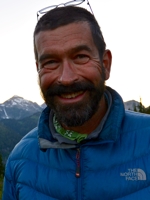
Drūgath
by David Axelrod
David has lived for 30 years in the Columbia River Watershed in the upper reaches of the Grande Ronde River between the Blue and Wallowa Mountains. His house is on the steep south bank of an abandoned meander, where the river flowed at the end of the last ice age.

—old word and older fear,
the low water, the autumn fast
and third month of famine,
drought deepening like dust
on the pack trail alongside
Bear Creek, where water is
scarcely a dream of itself today
in transit from tarn to empty
ditch that irrigated alfalfa
when snow still fell in winter.
Below you, down deep,
sifting through gravels,
and deeper, seeping along
fractured fault-blocks,
dikes, and rills, the old water,
hydraulic memory of earth,
seeks the bottom of time.
© David Axelrod

The Diplomatic Envoy
by David Axelrod
David has lived for 30 years in the Columbia River Watershed in the upper reaches of the Grande Ronde River between the Blue and Wallowa Mountains. His house is on the steep south bank of an abandoned meander, where the river flowed at the end of the last ice age.

It's odd to find a man made of sticks,
not a man exactly, but not the revered
insect either—the walking stick—
ambling along my street un-camouflaged,
an uprooted refugee from the assailed,
slow-moving forests, a man like me,
gnarly leg- and arm-boughs,
a blunt lopped-off stub for a head,
hair roots shedding clumps of dirt,
his wounds armored by scales of bark.
Welcome, arboreal guest, just-arrived,
wide-eyed, pecker-hole ears alert,
tongue—just a tender leaf—tasting air
the way children open their mouths
in summer, catching drops of rain.
His is an original mind at play
in parks, vining up monkey bars
and brick walls, waving halloos
to the awestruck kindergarteners
passing in files of two, holding hands.
My friend, the green man avows
the morning of the world secured
and covenant renewed. In full flower,
clouds of pollen stream toward him.
I swear to protect this open-to-all
eagerness, this true bonhomie,
this readiness to find comrades
and hold us close. I too wish to be
that forthright friend and guide him
past the wary, past firewood gatherers,
avoiding knots of phlegmatic bullies
outside arcades, who light up and smoke
in silence, feigning their disinterest
in such guileless, out-of-place ardor.
Given even half a chance, they would
sneak up behind him and club my friend
with the business end of an ax,
so loath are they to allow this gangling,
wise envoy from the great forest councils
to deliver the dispatch entrusted to him—
Brother, he whispers across my pillow,
Let there be no more diseasèd nature,
no ugly no broken no disordered or shamed.
© David Axelrod

The Thirst-Bag
by David Axelrod
David has lived for 30 years in the Columbia River Watershed in the upper reaches of the Grande Ronde River between the Blue and Wallowa Mountains. His house is on the steep south bank of an abandoned meander, where the river flowed at the end of the last ice age.

In the end, water too
had become just
another scant standard
whereby we reckoned loss.
She led the way across ridges
into parching winds,
a rain of sparks and hot ash,
through blackened stands of pine
and smoldering wind-fall.
Adrift in manias, we brooded,
old feuds billowing ill-will
and baleful mind.
How could we trust
the world-soul to thirst still
for dry skin and wish to soak it
all the way through?
Listen, she said. A cold
astringent psalm
trickled across cobbles.
She pointed up the gulch,
where the north fork
once joined the south,
at a gravel bar covered
in puzzlegrass and tears
seeping from a cutbank—the past
surfacing in the present.
She pulled me down beside her,
the air sweet with the aroma
of buckbrush and mint.
We filled the thirst-bag
with wonder, watched it swell,
full of losses yet to be borne.
© David Axelrod

Temperature Blanket
Michigan: Local woman tracks temps while weaving a blanket.
A strand for every day of the year, reds and oranges representing the high temperature.
by Natalie Tomlin
Natalie lives in the Grand River watershed in Grand Rapids, Michigan.
Find her after work, with a glass of wine and a needle, on the day it shoots to ninety-two degrees. She unpacks her dazzling yarn, exhales deeply as it uncoils. Decimated dandelions and tiger lilies pitch through October in a tidy vein as giddy teens corral shopping carts in t-shirts, dying grass prickles, cashiers chat in air-conditioned lanes. Weather as art: it’s impossible not to admire the orange ray passing through blues and greens. What year did we trick-or-treat in snow pants over our ballerina costumes? When did that ice shelf submerge just as bare-bellied genies trotted across lawns? Yesterday, a bat was discovered nestled inside a box of Organic Marketside Spring Mix at Wal-Mart. A wiry February Monday flares between our local woman’s finger and thumb. We clutch quilts, prayer beads as March first looms. But admit it—Spring can’t come soon enough. Let’s swaddle an April baby in this work of art.

© Natalie Tomlin

The Science Teacher
by Robert Fillman
Robert lives in the Lehigh River Watershed in eastern Pennsylvania.

When old Mrs. Helmut got sick
Miss Carson was her substitute.
She was young, straight out of college,
voice as soft as the knee-high grass
in the fields behind the playground.
She taught us about recycling,
how to conserve more energy
by swapping incandescent bulbs,
hanging our wet clothes on the line,
unplugging old appliances.
She asked us if we had ever
heated water with a peanut,
forced our nine-year-old minds to think
beyond broken chalk and blackboards.
We made compost in the courtyard
out of our leftovers from lunch,
went on field trips to Cedar Creek,
gathered specimens to study.
She took us to the water works
where we watched sewage get filtered
into vats and sent to landfills.
My dad called her a tree hugger.
My mom thought she was too involved,
too motivated, much too bold
for her own good. Both couldn't wait
for Mrs. Helmut to return,
for the leaves of enlightenment
to fall. The last time I saw her
she was staring out the window
of our fourth-grade classroom, singing
to herself while she watched a group
of sparrows and nuthatches peck
at the sunflower seed feeders
we made for her going away.
© Robert Fillman
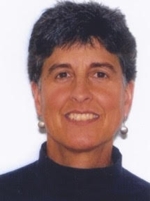
Migrations
by P.V. Beck
P.V. lives among the ponderosa, juniper, and piñon high in a valley carved out of the San Cristobal Creek watershed where she can look out across the Rio Grande to where the Creek ends its journey in the high desert.
If there are patters and whispers secreted to all but Fox
and halos of quanta invisible to all but migrating flocks of birds—
what do we know of prairies and rivers that run to the sea?
The bombast of human brains fills estuaries to build ports and cities,
turns rivers into highways and kettle ponds into perfect rows of corn.
Our lurid inventions and crisscrossing contrails grab force fields and twist them into
knots tearing apart the riverine current in the sky where geese flail in neon twilights.
When Fox flounders out of the mud at the edge of the pond she erases the moon.
A lone frog emerges from the ripples and sings to a ceaseless desire,
while our poor souls emptied of wonder
wander lost between the teeming alluvial plains
and the palms of our hands that used to tell stories.
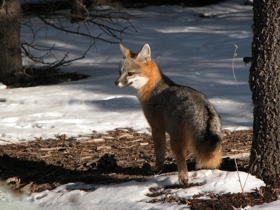
© P.V. Beck

This Old Earth
by P.V. Beck
P.V. lives among the ponderosa, juniper, and piñon high in a valley carved out of the San Cristobal Creek watershed where she can look out across the Rio Grande to where the Creek ends its journey in the high desert.
Fox knows something’s afoot.
The leaves change two weeks early and drop without color,
spiders the size of crabs appear out of nowhere
hooking their tapestry of empty corpses into the forks of trees.
Forgetful skies pass through odd phases in a ragged light,
chorus frogs sing one night and are gone the next
and there is dread in the shallow trickle at the confluence of streams.
Like the old rhythms that once ran with abandon
flocks of sparrows still twirl in a swirl of falling leaves
and there are still raucous evenings when flocks of red-wing blackbirds
settle down among the cattails.
But in those interlocking dances rings a doom Fox faintly hears,
the incantations of a stranger who at the season’s turn
comes knocking whimsy from the music of the spheres.
© P.V. Beck

Tidewater
by L.A. Weeks
L.A. Weeks grew up in the Chesapeake Bay watershed. She now lives near Hood Creek, part of the Cape Fear River Basin.

The old beach road–how to say it?
Crunch of oyster shell pavement,
a salt marsh canticle woven through–
trill and hum creek-split to single notes
in the bay. The old beach road–where it ended
as a loose shift of dunes and how beyond them,
the sea would chant itself undone.
Tonight, my headlights join a blur
spanning every inlet. I pass high-rise and strip mall
without a word. How wave-beat rip rap
confesses shells ground fine by tires.
How expansion joints in a bridge
thump out a sentence–how desire
overruns a plain, covers even its remembrance.
© L.A. Weeks

Crab Country Litany
by L.A. Weeks
L.A. Weeks grew up in the Chesapeake Bay watershed. She now lives near Hood Creek, part of the Cape Fear River Basin.

Let the ocean dazzle; if we build on today’s sliver, let us
build for today.
Let it bring in a haul of horizons.
Let Spartina stretch forever to our fathers’ crab pots.
Let the fog horn find its berth between midnight and
morning.
Let sherry propose marriage to roe. Let it dally with
Old Bay.
Let the carrier group be gray as it rounds Cape Henry.
Let red shift restlessly at the pier.
Let July’s bathtub foam with sting.
Let a cracked claw shatter winter.
Let the salt marsh oracle buzz beyond ocean’s heft.
Let us be smaller than the unborn in a Mermaid’s Purse.
Let us lie pungent at noon on a tide line we cannot claim.
Let tomorrow’s cyclone devour the spit and what we built
for today.
First appeared in Alabama Literary Review 2013 Vol. 22, Number 1.
© L.A. Weeks
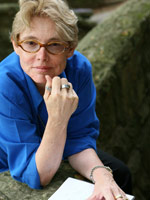
Not the Nightly News
by Dawn McGuire
Dawn lives by a tiny riparian habitat in the Orinda Woods in Northern Calfiornia. She shares the land with a splendid gray fox who hunts there. Orinda was named in honor of Katherine Philips, the first woman in England to be acclaimed as a poet in her own lifetime: "the Matchless Orinda" (1632-1664).

This ransom idea has caught on.
The boot on your tire.
The loan on your home.
The war in your name.
Oh, and we have your daughter.
Her dinner is parsley and water;
her breakfast: Fitbit.
All day long in the mirror:
Scale and Gaze.
Your son’s in Khost Province
lugging ROTC debt and an 80-pound pack
that wrecks his knee.
Oxy works wonders in the field.
Back home, heroin’s cheaper.
Easier to get.
Rehab, relapse, rehab.
Every bedroom, ransom.
Every day the war.
© Dawn McGuire
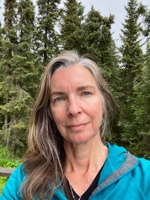
every rock
by Marybeth Holleman
Born near the Cuyahoga River just before it caught fire, raised in the Great Smokies near the rolling waters of the Upper French Broad, Marybeth transplanted to Alaska’s Chugach Mountains after falling head over heels for Prince William Sound—just two years before the devastating Exxon Valdez oil spill changed her life trajectory.

every rock remembers
the day I was born. remembers
the afternoon you learned
to walk. not even the slightest
wingbeat of a moth. as sunlight lifts
early morning dew escapes their
notice. they witness and regard all
life with the tenderness of
a grandparent gazing on the new:
eyes that see far beyond anything
words could convey and yet
yearn, regardless, for the happiness
of the child. I know this is so.
but I don’t know what rocks make of it.
my life, yours, they seem content
with how we’ve turned out
but when asked if we’re doing
what we were put here for, they are
silent. I press both palms hard against
their solid coolness, and all they say is,
do not think too much of your life.
then like an echo off granite cliffs
once covered in ice I hear,
do not think too much of all life.
it is a sweet interlude in the turbulence.
we will be missed.
© Marybeth Holleman

Whales at Night
by Marybeth Holleman
Born near the Cuyahoga River just before it caught fire, raised in the Great Smokies near the rolling waters of the Upper French Broad, Marybeth transplanted to Alaska’s Chugach Mountains after falling head over heels for Prince William Sound—just two years before the devastating Exxon Valdez oil spill changed her life trajectory.

they come
after the day’s
fishing fleet
has gone to anchor
awaken us
with a sigh
that sounds human
but is whale-breath
the long exhale
after a deep dive
sprays dappling
concentric rings
left by their arcs
into air
on an otherwise
silent and glassy
sea
© Marybeth Holleman
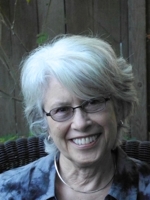
Psalm of the Four Corners
by Beverly Burch
Beverly lives in Oakland between the hills of the Coastal Range and the SF Bay which drains the sixteen rivers of Northern California.

Alleluia with the crow and bobcat.
Let our anthems roll through the desert. For here
in the Great Basin there’s solitude.
Once we ascended high places of Zion.
Yea, verily, now we look down
on Airstreams and concessions stands.
Once Baptist Draw and Upper Chute Canyon
echoed in descant. Now engines of combustion
desecrate stone arches. Black Mesa
and the Kolob reveal larceny.
Make a joyful noise with the tambor and hubcap,
sojourn in gullies of thrice-broken dreams.
Beseech backpackers to leave no scat,
pray new age shamans and ATVs run out of gas.
Blessed be the deer and the antelope.
May 10-gallon hats of militant grazers
blow through the rabbitbush.
The silence of the rufous Escalante,
the crusted spine of the Chuska
will lead us to deliverance.
And all the days of his life may Old Paint
ride around real slow. Amen.
© Beverly Burch

Psalm of the Glass City
by Beverly Burch
Beverly lives in Oakland between the hills of the Coastal Range and the SF Bay which drains the sixteen rivers of Northern California.

Walk through the forests of glazed towers—
behold, no acreage below, only light-belted
buildings, the high rise of suited workers.
Mountains tremble in their reflection,
clouds shiver across board rooms—
how elegant the race toward dystopia.
Figs, almonds and willows
grow on rooftops. Bee and bee-eater
nest in parapets.
Truly the poor were driven out
with the deer mice. Splinters of the past
rot under us and overhead,
only a blue limit. Shrill, the harbor’s whistle,
clang-clang of silver.
Spotted cats, mink, fat-tailed fox ran
before trappers. Before sawmills, before miners,
carboniferous mosses slept in hillsides.
Before explorers. Before settlers or sightseers.
Who remembers native earth raising
red cedars? They alone scraped the sky.
© Beverly Burch

Psalm of the Traffic Stream
by Beverly Burch
Beverly lives in Oakland between the hills of the Coastal Range and the SF Bay which drains the sixteen rivers of Northern California.

In the ceaseless onrush of I-80
clouds fly at us like soggy angels.
Stippled waters of the Bay murmur lunacy.
We thirst for the slow life yet hunger
for speed, turn our heart’s gears at ten miles
over the limit.
Everyone has destinations.
Verily, we sing the fascination of velocity,
of flirting with deadlines and white-knuckling it.
Behold self-righteous ones who barrel
three lanes across rush hour.
Let us rejoice instead in upright travelers
and pray for deliverance from adolescents
who straddle the line while texting,
the stench of the big rig.
May we learn to be late for the appointment,
to be late for everything, not show up at all.
And blessed be the small voice
of the indolent children we once were
who yearn to return to leafy solitudes.
Yea, how easy to drift, this road a cut artery,
the familiar one-way. And should a drunken motorist
demolish us, may we dwell among
rutted backroads forever.
© Beverly Burch

Psalm of the Blue Ridges
by Beverly Burch
Beverly lives in Oakland between the hills of the Coastal Range and the SF Bay which drains the sixteen rivers of Northern California.

Yea, we walk through wooded hollows where
we once courted love and meet only the animus
of male rifles. We fear.
Suffer blood of the possum and secretive quail,
crash of the doe through the Doghobble.
We lie down beside the sweet laurel
amid toxic detritus of three-day partiers
who anoint themselves with firewater.
Our faith rests in mountain women picking banjos
who lead us from still waters to the two-step.
May the scent of calycanthus prepare us for slumber.
Mountain bikes crunch on gravel
and rampant machinery of developers rattle our ears.
Surely summer homes will overtake us.
We give thanks to ginseng and flame azalea,
autumn-hung hills that preserve us. The rusty
rod and staff of a trail sign. Yea, it comforts us.
And if we stray in the yellow buckeye
or dense basswood, surely the lone Ranger
and her green truck will arrive.
© Beverly Burch

Old Logging Road
by Neva Bryan
Neva lives in the watersheds of the Clinch River and the Powell River in the mountain coalfields of southwestern Virginia.

An old logging road sidles
around the mountain
behind our desolate house.
My desolate house.
I trudge through mud to the top
and eye the rapescape
of amputated limbs,
knotty torsos,
exposed hearts
ringed
to count the years.
Here deep gashes scar
abandoned land.
Poison ivy, kudzu -- wild vines --
fill empty spaces.
I stumble and reach out,
clutch a blackberry switch
to steady myself.
Thorns pierce my palm,
draw red beads to the surface.
I rub blood across my barren belly,
weep for this wasteland.
Originally published in Bluestone Review
© Neva Bryan
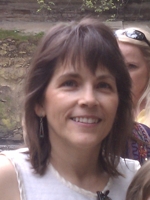
Meanwhile, at Key West
by Shalamar Sibley
Shalamar lives in the Upper Mississippi watershed a short distance from the confluence of the Minnesota and Mississippi Rivers, and Minnehaha Falls.

I.
Under a Live Oak over coffee with chicory
I catch up on the news
The logic of a boat is self-evident.
New Orleans has got the low-down blues,
New York wants to hold back the water
and some say this place’ll be under water
soon, sugar-sand beaches submerged.
This island borrows time,
awash in its Key West blues.
II.
Secret garden, mid-morning.
I prop my bike against a Banyan.
The world shrinks around me.
In the circumstance of this history
first cause was necessary boredom
when the doldrums set in
looping like a Steely Dan riff
through the sleeping drift of collective mind,
barely audible. For some time many things
flowed past perception--
What is the value of Bougainvillea red?
Where have all the key deer gone?
They looked for dry land to take hold,
to wake us up to smell the mangroves
but this is selective hearing.
(Cacophony’s too soft,
the stench, too sweet.)
III.
Afternoon. I walk before the storm,
I’ve traveled to the end of the road.
More of what’s forgotten surfaces--
tropical almond trees on Petronia Street,
how the bromeliad on Amelia breathes,
rooster crowing at noon on Caroline,
lost in maladaptive chronobiology
as Hemingway’s cats swim past us.
IV.
Mallory Square at sunset. In this world of fire eaters
where clowns walk on stilts
every move should be considered action
Meanwhile
we gather on front porches,
small talk swept up by ceiling fans.
We stand at the shoreline
against deepening melon sky.
Everyone’s in tow, adrift
in the uncertainty of the evening.
V.
Life on a coral mountain, arms interlocked,
we stand on the shoulders of our ancestors.
Fact is, downsizing is hard.
Before we know it
one dreaded hallowed day
such a planet is left
hollowed out by its own absences,
so maybe we jump ship
and dive deeply in, past history
to dig through a muddy post-mortem
to finally read the sign,
motto of a submarined Old Town,
One Human Family.
© Shalamar Sibley

The Last Remaining Male Northern White Rhino*
by Dilantha Gunawardana
Dilantha lives in the small island nation of Sri Lanka, called the pearl of the Indian Ocean, on the edge of a city, surrounded by squirrels, noisy crows and the occasional monkey, a place where nature is fast being engulfed by concrete but yet still harbors a species-rich biodiversity.

Someone enterprising, perhaps a zoologist,
once opened a Tinder account
for the last remaining Northern White Rhino male
in the wild, to trigger a hat collection,
to save the last of his species, from the jaws
of a cruel and callous extinction.
now passes his times in sparsely vegetated plots of land,
and water holes, dreaming of the day
he, the heart-throb of his dwindling kind,
will bring a little pocket rhino to this world.
How storybook it all looks in reproduction biology,
but sadly, a long shot in math.
The dirty work that a man has to do,
the bump and the grind, knowing his kind is depending on him.
The two-horned wonder, kissing from just beneath the hairy horn,
and making love with the other horn,
an endowment as too with other mammals,
making babies the old-fashioned way, answering the call of the wild.
The tragedy of being the last extant male of his species,
those plus-size unicorn wannabes, who grow up
to carry strands of hair as sword-like horns.
How a tinder date has so many possibilities:
perhaps a night time escapade,
when two rhinos queue, one after the other,
looking at the beautiful super moon, perched
over the savannah, letting nature work
out the magic and the math,
of what is likely to be the seminal work
of a perennially horny wonder.
*The last Male Northern White Rhino died in March, 2018.
© Dilantha Gunawardana

Autumn
by Erin Jamieson
Erin lives near the Little Miami National Scenic River.

I yank the lead harder, and the camel turns to spit at me.
“Bolioch! Stop!” I order.
The ground is adorned with the decomposing corpses of fallen leaves and the tree branches are bare, hauntingly human as they sway. There is not a patch of vegetation as far as the eye can see. The camel seems to sense this: he stops every few feet, turning his head towards me. His mouth hangs open in thirst, revealing crooked, yellowed teeth.
But this time, I cannot get him to budge. I see why: a young man, some twenty years my junior, is in front of us, also leading a camel. He wears no hat, and his face is raw and red, and I know it will blister from the cold. What man is foolish enough to wander in the thick of November without a hat?
“You’re practically dragging your camel. You’ll never get anywhere that way. Here, let me show you.” Before I can protest, he snatches the lead from my hands.
I am pleased when my camel refuses to move.
“He listens to me,” I say, taking the lead back from him. An hour ago, I would have given next to anything to see another human. Now the insult stings me.
The young man shakes his head, reaching for the flask he carries and taking a gulp of what I presume is airag—it can only be airag, for the putrid scent of fermented milk reaches me.
“Just trying to help,” he grunts. “Didn’t mean anything by it. Live around here?”
I stifle a laugh. “No one can live here.”
He settles on a lone tree stump, his camel obediently standing beside him. “Third time this year I’m moving,” he says. “Gets exhausting.”
I nod, but his words do not touch me. Everyone moves in the Gobi; home is where there is fertile ground, where there is life. I stare up at the sky, as it slowly fades into afternoon. It is periwinkle blue, cloudless and vast. It is true what they say of the Mongolian skyline: here, it goes forever. It is as close to eternity as a man can glimpse while he is alive.
“I have to move on,” the man says, and then I realize that he has been talking, and I have not heard a word he’s uttered.
“Where are you headed?” I ask, repeating the very question I did not answer.
“South. I have some cousins who’ve agreed to share land.” He sighs. “I don’t fancy the idea, truth be told, but I don’t have a choice. I have little to my own name.”
“And you’ve lived alone up until now?” I wonder.
He shrugs. “With my father. He passed away a year, maybe two years ago now. I lose track of time.”
Passed, like the clouds pass over the sun, like a camel passes over a patch of land. As easily as that.
“Nice to meet you.”
“Bayartai,” he replies. He mounts his camel with the grace of an acrobat . He is young and dexterous now; it will be years, I think, before he tires, as I have, as my father and grandfather did.
I stare at the leaves beneath my feet, and when I glance back up, the young man is nowhere to be seen.
He has vanished into the vast wasteland, nothing more than a speck of dust.
My grandfather fell ill the winter I turned ten. My mother laid him down in a cot and nursed him day and night. In exchange for the stew we fed him, he’d feed us tales of his boyhood, how he used to be ‘the greatest hunter for miles.’ We’d laugh as he told stories so outrageous you’d be hard pressed to believe them.
But as the fever grew, he began to forget us. He called us wind, shadows. He asked why there was no sun; could someone please get the sun back? Only after several times that he spilled food over the front of his sheets did we realize he had also gone blind.
On the eighth day of his illness, I sat beside him all day. I did not feed the animals. I did not fish. I did not help launder clothes. I sat and held my grandfather’s hand, thin as paper and leathery from working in the sun his long life. I stared into his eyes. They had no life in them.
My mother let me stay by his side; it is not the Mongolian way to abandon family, even at the very end. But on the twelfth day after I had been crying endlessly and refused food for two days, she told me to leave.
I couldn’t.
It is noon when I see them.
I hope to pass among their camp silently, but the camel betrays me: long overburdened and as desperate for a drink as I, he rears his head and snorts. It is a soft sound, a sigh, but one of the men working on the edge of the camp turns his reddened face to mine.
“Taniig hen gedeg wei? What’s your name?” he asks.
“None of your business,” I answer. I can feel the camel stiffen beside me. “I’m just passing through.”
The man is heavily mustached and stocky, his skin leathery from the constant gaze of the unforgiving sun. “It is my business, seeing as you’re trespassing.”
“I wasn’t aware you owned the land.”
The man’s jaw visibly tightens, and he sets aside his shovel. A few of the other miners turn their heads in our direction.
“We’re digging for copper,” he says.
“You’re too late,” I say, unable to keep the bitterness from my voice. “Mining camps have already been here.”
“Must have been quite some time ago.”
“A month, two months,” I say carelessly. “Once it’s harvested, it’s harvested.”
“You think there’s nothing here?”
I shrug. “That is your business, and not mine. Let me and my camel pass.”
He laughs. “Humor me.”
I sigh. “If there was copper to be found, it already has been. The reason this land is uninhabitable is exactly this. Mining camps are set up casually, for greedy hands who understand nothing about the actual land.”
He gazes at my frazzled camel and back to me. “You’re a nomad, I take it?”
“I am when I need to be.”
“Well, I’m a miner when I need to be.”
“No, you’re a bloody fool. Now let me pass,” I repeat.
“Good luck finding grazing land. There’s another camp set up a few miles down from here.”
I do not doubt it, but I’ll be damned if I’ll let him discourage me. I start to walk around the ditch he is situated in, when he stops me again.
“You can’t go that way. We’re digging there.”
I laugh humorously. “You dig everywhere.”
He raises his hands in exasperation. They are stained inky black. “I do what I have to, to make a living.”
“You see this?” He brings a lump of earth to my face, and my camel rears forward hopefully, then retreats, seeing there is nothing to eat.
“It’s dirt.”
“Wrong. It’s more than that. It’s capital.” He throws it down. “Know what I think?”
I don’t really care what he thinks, but I entertain him.
“I think you’re lying,” he continues. “I think you know there’s molybdenum here. And I think you don’t have an ass’s right to judge how we use the land. Your camel eats away at it, doesn’t it? You use the resources, just in a different way.”
“Maybe,” I allow. “But I don’t bloody my hands doing it.”
He starts to dig again. “Have no idea what you mean.”
My camel has lost his patience and lets out an exasperated sigh. I can feel him tugging at the lead, urging me to leave. But I can’t.
“Yes, you do. Every year men like you take away our grazing lands. Our animals sicken and die. There is nowhere for us to live. You could set the camps up systematically, but what do you care? You scatter them around like ashes, and the whole land bleeds under your shovel, all so you can have some damned fancy radio or a cell phone or a new television set.”
“You don’t know anything,” he repeats, but his eyes flicker, and I know I’ve touched a sore spot.
The camel lets out another sigh. I ignore him. “You’re telling me that this – “ I wave at the camp, “ – is necessary? “
“You don’t own this land, fool.”
“No more than you do.”
“Let me work.”
“Work,” I murmur. I start to leave.
“You can’t fight it,” he calls to my retreating back. “Someday you’ll learn that you have to leave the past behind.”
“Don’t tell me,” I say, gritting my teeth, “how to live my life.”
“So what the hell is your solution?”
I throw the first punch. I am not a violent man. But when I bear down on him, I am punching his jaw until I hear it crunch and do not stop, even when a blow sets my nose gushing. We are fighting in the dirt and the blood until three other men pull us away from each other. He will have a scar where I threw the first punch, I can see that now. I am breathing heavily, feeling dizzy from what I have just done.
I don’t need to be asked to leave. I mount my camel, the miner’s protests vibrating in my ears.
“Be yadarch bain. I’m tired,” I say, and even though the camel does not respond in words, he tilts his head at me and releases a shudder.
“It won’t be long,” I murmur. But I don’t know that. It takes nearly an hour before we reach a small tributary. Even from a distance, I can smell rot. Lenok and graylings lie on the edge of the water, their yellow eyes wide and vacant, their silver skin peeling from their bones like the skin of an orange. Their mouths are open, revealing teeth that are grimy and saturated with the murky brown of the runoff that has leaked into the water.
When my camel tries to drink from it, I shake my head. “We need to keep moving.”
I am not quick enough. The camel’s lips are stained with the runoff, with the stench of dead fish, after he takes a quick drink.
And then I notice a flutter of motion near my foot. It is a fish, perhaps the sole survivor, half on land, gasping, flailing. It’s attempting to inch back into the lurid water, but I can’t stand to watch. I spear its chest, and with a few writhing motions, it dies.
“Leave it alone,” I tell the camel as he starts to sniff it. “He’s already dead.”
He’s already dead. He’s already gone.
“He’s already dead, Chulun. He is of no use to us, or anyone.” My mother told me as I bent over my grandfather’s weathered body.
He was still breathing. He was still my grandfather. He was the man who’d taught me that land was more than land. He’d shown me how to find the constellations of stars in the endless night sky. He’d taken me fishing and hunting. He’d saved his earnings for nearly a year to buy me a radio from the heart of Ulaanbaatar.
He is of no use, my mother repeated.
It was also my grandfather who’d taught me how to let go. He’d shown me how it was more merciful to shoot a wounded animal than to let it bleed out. He’d held my hand as we lowered my father—his own son—into the ground.
Had I known that in an hour he would wake and call out my name, I would not have left. Had I known, I would not have left.
But I did, and, sixty years later, the guilt is etched in the marrow of my bones.
I am not sure what compels me to pick it up.
The fish is slick even under my glove. I can feel where its vertebrae have shattered, and I wonder how long it lay gasping for air before I killed it. I am glad when the blood stains my glove, as if it is proof I have done the right thing.
I bury it under a pile of fallen leaves, knowing its body will decay with theirs. I know, too, that winter will be hard this year, and when the ground freezes, the fish will be forgotten. And maybe, in spring, there will be new fish.
A long, slow roll of thunder. Showers come without warning and so they fall now, heavy thick sheets of rain, striking my cheek like a slap. This rain is heaven sent, after miles without water, after polluted tributaries. With shaking hands, I reach for my empty flask, trying to catch the rain, which will have to sustain us until we find water somewhere else.
I can only hope this rain continues, that I will be able to fill my flask again. That we will make it. That is what fills me, as I struggle to catch the sweet cold rain: hope.
Hoping we will find somewhere to graze soon.
Hoping.
© Erin Jamieson
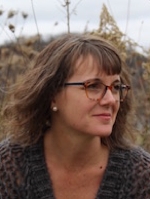
Plastic Debris, Borne
by Kelly R. Samuels
Kelly lives where the La Crosse River, the Black River, and the Mississippi meet and meld.

Flotsam and what sinks.
Found gathering on the bottom,
layers, like sediment.
Bits
and pieces. Dregs.
The dregs of this brew,
this day,
these hours.
Toss the cap there,
throw the bottle elsewhere.
There’s a man somewhere warmer than here
building houses with these bottles – lining walls –
their captured air insulation.
And if hurricane comes,
a means of transportation, too, he claims: the makeshift raft
serving as savior. Christ and his fishermen.
Their lines are now plastic, hauled up and photographed.
Catalogued as evidence of what is borne on currents,
carried and bobbing, caught
in the throat occasionally.
We used to – as girls – slide the plastic tabs on our ring fingers
and say, Darling, how lovely.
Now we stand, scissoring the six-pack’s collar
into tinier and tinier fragments, thinking
we are helping,
believing we are good.
Previously published in Common Ground Review.
© Kelly R. Samuels

Antarctica
by Adam Scheffler
Adam lives near Massachusetts Bay, a half mile north of the Charles River.

People don’t think about me,
or if they do it’s as a vague cold
waste, the cuteness of penguins,
or territorial disputes, how even
deep in the frozen tundra, politics
carves me up like a pizza pie
sliced by Norwegians into
a checkerboard, so everyone can fight
over the middle slice with
its crustlessness and its field of
perfect cheese. But it turns out
I have a secret identity. It turns out
for millions of years I’ve been
clutching to the vast refrigerator
of my chest so much ice that melting
it will drown both Hong Kong
and New York on a date that sounds
futuristic, but isn’t. Which is
why Germany is now suddenly
the least despicable nation, vacuuming
grass & recycling footsteps, the
whole country amok with bad hairdos
from wind turbines, as America keeps
saying happy birthday to itself and
failing to blow out its rivers. Look,
I wouldn’t tell you any of this,
I’d be happy to lie low, go on being
tickled by Argentina, looking huge on
Mercator maps, and being the single
continent without a murder-suicide,
except that I’m losing my grip.
So I want to cluster you together like
penguins keeping warm, or high school
football players getting a pep talk
from Coach, to say it’s time to have
a TV channel devoted to earthworms,
a Macy’s Day Parade for eels – it’s time
to reevaluate, to worship everything
that’s been keeping you alive.
© Adam Scheffler

Signs of Changing Climate in My Garden
by Bonnie Overcott
Bonnie lives in the Minnehaha Creek watershed two blocks from the Mississippi River and eight blocks from Minnehaha Falls Park.

“I’m not a scientist,” reply some of our elected officials when asked about climate change. You don’t need to be a scientist. Ask any amateur gardener or bird watcher and they can document the rapid and accelerating changes they see in our climate.
Gardening since my 4-H days in the late 1950’s, I used to joke that I wanted an orange tree in my Minnesota back yard. If that wish ever became a reality, our earth’s climate would have gone through devastating changes. Nurseries advertise hardy orange trees that can be grown as far north as central Georgia. Orange trees suffer damage between 26° and 28° above zero F. Even in Minnesota’s southern zone of 4b, temperatures can hit 25° F below zero.
I’ve joined my neighbors who spend part of their summer picking off the Japanese beetles feeding on the gardens since their first appearance in the 1990s. They are not the destructive force in Japan, where they have natural predators, that they are in Minnesota. Once controlled by our cold climates, they thrive in our warmer climate. Each beetle eats over 300 plants in its lifetime. In my garden they can be found feasting on the leaves of the raspberry bushes, hibiscus blooms and the leaves and blooms of the rose bushes. They chew until the leaves are lacy and skeletal. Gardeners with blogs are documenting their slow movement northward as our springs become warmer.
There’s no known herbicide specifically for Japanese beetles that won’t harm bees and butterflies. The grubs live in the ground and eat the roots of the grass, causing dead spots. Traps sold end up attracting more beetles to your yard. The best method of ridding the beetles from your garden is to go out each morning and late afternoon with a jar of soapy water and shake them into the jar. I hate killing things, but these critters are so destructive, I’m perfectly capable of plucking them from my hibiscus blossoms or buds with my bare fingers and plopping them into soapy water.
In the last days of September, the autumnal equinox marks the end of summer. We slowly slide into the darkness of winter as our earth tilts away from the sun. In the past a hard frost killed the annuals, tomatoes, and cucumbers in mid- to late September. I was never one to bundle up my tomatoes in old sheets and towels to extend their growing season, preferring to let nature take its course. The raspberries quit bearing fruit. The basil succumbs to cold quickly, but the other herbs like parsley, thyme and sage stay viable and usable for a few more weeks. The house plants are snugly inside. The last September frost in my area was in 2000.
After the frost we often enjoyed an Indian summer, free of mosquitoes, with warm days and cool nights without the extreme heat and humidity of July and August. Around the neighborhood, red and gold leaves are shaken from the deciduous trees by fall breezes. As their leaves float down and swirl around on the sidewalks, people take their last pleasant walks of the year. The leaves are shredded and used as mulch in my gardens, where they will decompose, feeding the gardens with the nutrients in their leaves, adding organic matter to the soil and feeding the squiggling earthworms that in turn will aerate the soil by burrowing around and leaving nutrient-rich waste products in their trail.
It always seemed such a shame that the first frost devastated the perennials and annuals. After adding color, form and texture to the garden, the perennials turned yellow and brown as they gave up the ghost and died back to their roots. The annuals, which brought brilliant color to the garden, turned brown and black and limply draped over the edges of the window boxes, planters and pots, ready for the mulch pile, even though the days were still bright and sunny.
Now in October, as I sit and observe my gardens, the Joe Pye weed’s pendulous seed heads bow towards the ground. The goldfinches, fading from their neon yellow summer color to a drab brown winter coloring, merrily fly from one to the other eating the seeds. My cat likes to sit underneath the six-foot plants and look up at the birds feasting. The slimy gray slugs have taken their toll on the tenderest hostas, chewing the leaves in between the spines until they are lacy. It’s time for the garden to go to sleep, but without that first frost it stays awake, slowly continuing its life cycle.
The sky seems bluer. The air seems clearer. The lawn begins to recover from the summer heat and grows vigorously into a thick carpet of emerald green. I refuse to do any mowing past Thanksgiving out of principle. In Minnesota the ground should be frozen, if not covered with snow by then.
There are an abundance of squirrels and birds at the feeders. The babies are mature enough to forage for their own food. The half-grown baby squirrels pilfer leafy materials from my gardens to carry up the trees to build their own nests for winter. The dried hydrangea heads moving up the trees amuse me as I wonder if they are constructing or decorating. The chipmunks have accumulated enough bird seed to crawl into their winter homes and stay there until they sense the spring sunshine or their seed cache disappears. I’ll have to yank the handfuls of spindly sunflowers that sprout in my houseplants, planted there by those chipmunks. The monarchs that normally leave at the end of August are making a few more passes through the gardens.
Another guest visits my garden at night. Opossums, unknown to this region twenty-five years ago, scuttle into the yard. I hope they feast on the slugs that devastate the hosta rather than my raspberries and tomatoes. The warmer winters enabled them to expand their range from the Southeastern states throughout Minnesota. In our coldest winters, they may get frost bite on their ears or tips of their tails, but they survive.
Late October and there’s still no killer frost. One January, my neighbor divided and moved her perennials. January in Minnesota and the ground was still not frozen, let alone covered in a blanket of snow. Rather than a white Christmas, we often get rain. I worry that the spring blooming plants will get confused as I look at my garden and see the crocus sending up green leaves and the lilac and azalea buds getting plump.
Now we often go from the hot, humid days of July to the dog days of August into our Indian summer with mosquitoes. One year, I ate my last home-grown tomato in December and mentioned it in my Christmas letter. The annuals still bloom, but they’re leggy. They performed beautifully all summer. Without that first freeze they’re forced to go on living like an ancient person convinced God forgot about them.
“Indian Summer” was first used in 1778 by a New England farmer and became commonly used in England in the 19thcentury, even though its origins came from the Native Americans of the new world, not the Indians of occupied India. Today in the United Kingdom the frequency of Indian summers is indicative of our warming earth.
The Indian summer that sometimes came after the first frost in Minnesota was a welcome gift. It motivated people to finish fall projects. It signaled that gardens needed to be put to bed by laying down mulch on tender perennials, wrapping tree trunks of young trees to prevent rabbits from nibbling them, and clean up gardens to prepare them for spring. Now it is another sign of our changing climate as it is just a late extended warm period at the end of summer. It seems heretical to tie Native Americans, who maintained a spiritual relationship with the earth, to a phenomenon caused by its plunder and abuse.
My USDA hardiness zone used to be a solid 4; the lower the number the colder the weather. Now there are parts of my state that are a zone 5 and zone 4 has moved further north. Large portions of Minnesota are one zone warmer today than they were in 1990. Many gardeners in my neighborhood are risking planting zone 5 trees and perennials. I’ve long envied the ability of my Texas cousins to enjoy crepe myrtles, typically a zone 7 plant. There are some varieties that are hardy to zone 6 and even zone 5. I’m tempted to go for it since I live in a microclimate of zone 5. It’s still a long way off for that orange tree, though.
Last year it stayed so warm until Christmas, I couldn’t make my ice lanterns. Families went bicycling on Christmas day.
© Bonnie Overcott
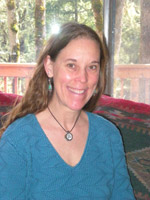
To Be Greeted at the River
by Carter McKenzie
Carter lives in the foothills of western Oregon’s Cascade Mountains in the Middle Fork Willamette watershed near Lost Creek.

the gray unpromising
cold becoming
your folded wings
your back
curved
over the rushing waters
I call you
blessing
the slightest turn
of your head toward me
the sharp
edge of your long beak
against
the river and traffic
ebbing and surging
echoing stone
and concrete
unceasing
hollow throats
so many
gone
dear brother dear friend dear
unknown
and where do I go
but away
so as not to disrupt
your attention
for what might feed you
for what might live
beneath the cold
grasses and waters
in this dark-green
November light
where I step back
not to lay this to waste—
vast
blue wingspan
my eyes have surely seen
From the author’s collection Stem of Us from Flowstone Press
© Carter McKenzie

First September in Tuolumne
by Travis Davis
Travis lives with the windows open on a hillside above Deer Creek within the larger Yuba River watershed, where he likes looking at the stars and Milky Way above the tips of the conifers at night.
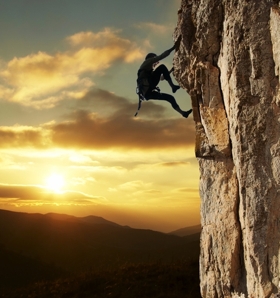
the estranged goddess arrives silently in your head when
you’re not trying to think about her
when you’re lost in your heavy breath
trying to scale backcountry stones
and your heart is heavy in the ecstasy
of being a heart
what a joy to be an animal
what a strange occasion to be flesh
what a day to sweat in the sun
as civilization burns along without you
I am saying when we leave our ego
we are cured
she is there
we are exonerated
and this is our only way
to ascend the sufferings
© Travis Davis
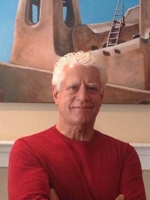
A Forest is a Castle
by Dan Cardoza
Dan lives a few short blocks from the American River in the Sacramento River Watershed.

The hill behind my house is my best
kept delusion with its colossal green
castle caught in the throat of forest
that never swallows. I walk in feet
of silent hoofs of thatch & rusty
autumn feathers. Then acorns pop like
red knuckles, first one then
two, then a whole fist full––but all is
forgiven in my forest. I can hear the
shadows call for night, first softly,
then in the melody of a breeze, then
their singing in the wind.
It doesn’t
really matter that I curl up next to a
large oak trunk, with its back of stiff,
& confess just the way I do at church,
though today I’m an atheist in a
cathedral a mad man architect built in
just six days. Darkness begins its tug
of blanket, all
shadows through the valley floor, then
hills, over scrub and brush, then over
darkening trees and finally over me as
I begin the fall of sleep with a
darkening blanket at my feet. I
awaken in a dream swallowed in a
dream, by squint of a
sticky green star wedged in a branch,
in the highest of bows in a cedar tree,
at the very tip of top. I open my gills,
in a stream of sleep, before the swell
of river. Politely I request the stars I
keep in my frosted glass boxes of
window pane, to
please keep my secret or risk the not
letting out again. And to keep my
forest pristine to enter once again.
Then I am enveloped in the scent of
water & salt where my delusions
become dreams, into the sleep of
night.
© Dan Cardoza